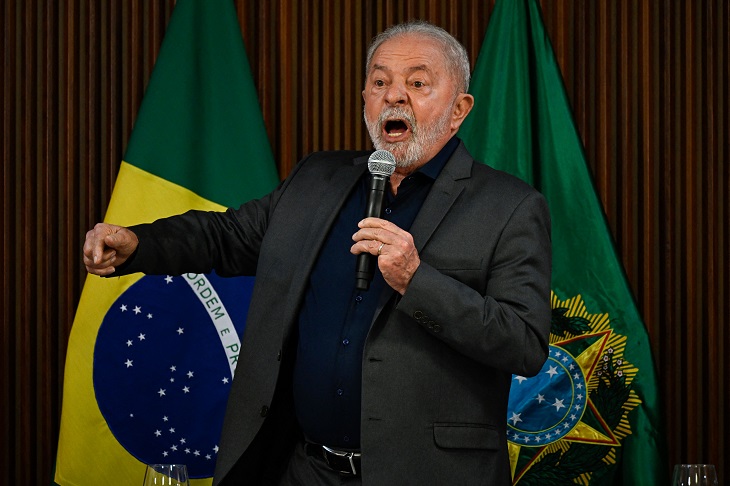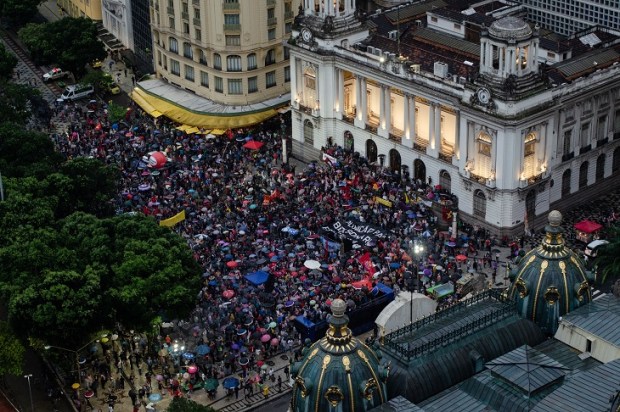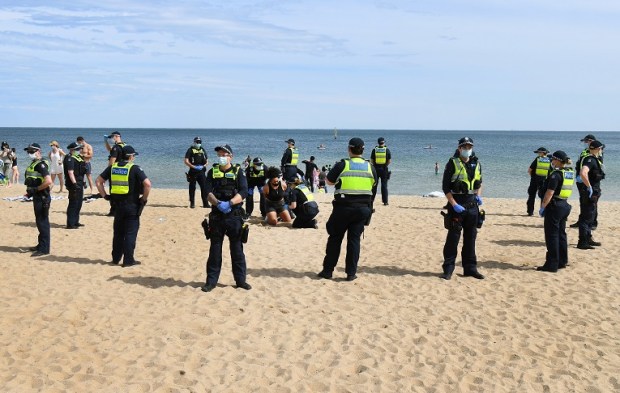Under Article 1 of the Brazilian Constitution, ‘all power belongs to the people, who exercise such power by means of their elected representatives or directly’. Apparently, however, nobody in Brazil has been allowed to question the transparency of the last presidential election. Whoever dares to do so ‘will be treated like criminals’, admonishes Justice Alexandre de Moraes of the Brazilian Supreme Court. At this moment hundreds of judicial arrests are taking place across Brazil.
This is how brutal dictatorships start. In a televised address on January 8, far-left President Luis Inácio Lula da Silva authorised the military intervention of Brazil’s Federal District. The newly installed President also tweeted a statement calling ‘fascists’ all those who recently occupied Congress to call for electoral transparency and freedom of speech.
To call those concerned citizens ‘fascists’ was an interesting choice of word. After all, when asked by Playboy magazine a few decades ago about which leaders he most admired, President Lula cited totalitarian murderers such as Che Guevara, Fidel Castro, Mao Tse-Tung, and Adolf Hitler. The brutal German dictator, Lula said, had what he really admired in one man: ‘The courage of proposing to do something and try to do.’
But few would have imagined that, under his newly installed regime, Brazilians would experience the creation of the first-ever concentration camps in their nation’s history; for the scenes recently observed in that Latin American country are visibly reminiscent of 1930s Germany.
At least 1,200 Brazilians, including the elderly and children, have been arbitrarily detained as part of the dismantling of a protester camp in Brasília, Brazil, on January 9. They were arrested for no other ‘crime’ apart from being camped in front of the army headquarters in Brasilia, believing they were protected by it and manifesting themselves for freedom and democracy. This was so until hundreds of police in riot gear and some on horseback amassed at the encampment, while army soldiers in the area withdrew.
When these concerned citizens were sent to prison, they went through a triage process. Pillows and blankets weren’t provided for ‘security reasons’, so that such ‘objects’ are not used for ‘acts of violence’. They will be entitled to a ‘sunbath’ once a day. These political prisoners have been forcibly inoculated with mRNA vaccines, in a clear violation of the Nuremberg Code. Common prisoners in semi-open regime have been released in order to have accommodated in overcrowded prisons.
‘We have now received information that there is a lack of water and food for them. Among those detained are demonstrators who acted peacefully. In any case, everyone needs basic conditions,’ said congresswoman Carla Zambelli (PL-SP). Many of them are elderly and children. In response, the Minister of Human Rights, Silvio Almeida, released an official note to declare that these peaceful protesters ‘deserve no human rights’ from the State.
On January 11, the National Council of Justice (CNJ) announced a crackdown on the entire Brazilian Judiciary. There will be a thorough analysis of judicial decisions so that any judge who decided in favour of anti-government protesters ‘will be punished’. As a result, from now on all judges in Brazil will have the obligation to adopt ‘a new stance’ which prevents them from ever trying to ‘soften the punishments’.
Perhaps it is also important to explain who the current presidential incumbent really is.
Back in October 2, 2002, the French newspaper Le Monde published a story which says that Lula ‘strongly believes that every election is a farce and a mere step to take power’. On October 5, 2002, his then foreign affairs advisor, Marco Aurélio Garcia, in an interview with Argentina’s newspaper La Nación, claimed that, once in power, Lula would have no interest in preserving democracy.
Lula told that newspaper:
‘We have to first give the impression that we are democrats, initially; we have to accept certain things. But that won’t last’.
Lula is a self-declared admirer of Fidel Castro – the later dictator of Cuba from 1959-2008. On his 2001 visit to Cuba, an admiring Lula gave this moving tribute to Castro:
‘In spite of the fact that your face already is marked with wrinkles, Fidel, your soul remains clear … Thank you, Fidel, thank you for existing’.
In April 2003, the first year of Lula’s first presidential term, Brazil abstained from condemning the assassination of Cuban political dissidents at the UN Human Rights Committee, even though Article 4 of the Brazilian Constitution explicitly says that the participation of the country in the international community must be guided by the ‘respect for the prevalence of human rights’. Speaking on behalf of the Lula administration, the then-Brazilian ambassador to Cuba called those political dissidents traitors who were ‘destabilising’ that communist regime.
As a way of re-constituting communism in Latin America, Lula and other members of his political party created, in 1990, an umbrella organisation called the Forum de São Paulo (FSP). The FSP was created to fight the ‘negative effects’ visited on communism by the dismantling of the Soviet empire. In 2004, its organisers declared that their major aspiration was ‘to compensate for our losses in Eastern Europe with our victories in Latin America’. As leader of the political party that founded the FSP, Lula was appointed as its first chairman. These meetings of the FSP have been attended by delegates of Colombia’s FARC guerrillas, Peru’s TUPAC-AMARU guerrillas, Chile’s MIR guerrillas, Basque separatist group ETA, and the Irish Republican Army (IRA). The US State Department considers all of these to be terrorist organisations.
After knowing all these facts, who would dare say that these presidential elections in Brazil were necessarily fair and transparent? Of course, it would be incredibly unwise for Brazilians to return a notoriously corrupt far-left politician to the presidency of their nation.
But there is a rather decisive international element in Lula’s victory as well.
In August 2021, US National Security Advisor Jake Sullivan visited Brazil to issue the following warning to the then Brazilian president, Jair Bolsonaro: do not even dare to question the reliability of the country’s electronic voting system. A month earlier, in July 2021, just months after entering office, President Joe Biden had sent his CIA director William Burns to travel to the country to meet with senior Brazilian officials. During that meeting, the US delegation warned the Brazilian government that Bolsonaro ‘should stop casting doubt in his country’s [entirely electronic] electoral process’.
Then, in a June 2022 meeting of the ‘Summit of the Americas’ meeting in Los Angeles, the Biden administration notoriously repeated the same warning that the US government would not tolerate Bolsonaro casting any doubt on the reliability and security of the nation’s voting machines. Since these statements came before the outcome of the election, this was a clear warning of dire consequences should the then Brazilian President contest the alleged transparency of the electoral process. But why would the Biden administration try to prevent anyone from questioning the validity of electronic voting in Brazil? In trying to answer this important question, US political commentator Gamaliel Isaac comments:
‘Maybe Biden is afraid that the Brazilians will uncover evidence of fraud in the Brazilian election that will somehow lead to uncovering of evidence of fraud in the American election … Does Biden know there was electoral fraud in Brazil and that there was electoral fraud in the United States and so want to silence anyone who says there was fraud?’
Or maybe, Isaac continues, this has nothing to do with that election in the United States. He wonders if the Chinese Communist Party may have something to do with this. According to him:
‘China wanted Lula to win and China has a lot of influence over Biden partly because of donations to the Biden Center and probably because of donations to Joe Biden’s son, Hunter.’
Be that as it may, just after a few outlets called the election in Brazil, the US President orchestrated a rapid international embrace of Lula. In short order, Canada’s Justin Trudeau, French President Emmanuel Macron, and British Prime Minister Rishi Sunak all released statements congratulating Lula. In a Twitter post, Macron, reacting to the protests in Brazil, said that Lula could count on France’s ‘unwavering support’.
As can be seen, Lula’s election and modus operandi have been encouraged by the oligarchic power leadership and globalist forces of the world. They have all claimed that the election of this far-left politician, who may now be able to finish the job he had started of turning Brazil into another Cuba or Venezuela, was entirely fair and transparent. As reported, the US government has now started even to deport opposition leaders back to Brazil and the Lula Gulags.
This is all taking place at the same time that compelling evidence has been presented that the January 8 riots in Brasilia were staged. According to Raul Jungmann, who served as Brazil’s defence and public security minister from 2016-18, it is simply ‘impossible’ to storm the heavily secured government buildings in Brasília without a ‘purposeful security breach’ which resulted in depredation of Congress, the Federal Supreme Court, and the Presidential Palace. Jungmann, who was for a time the leader of Brazil’s Popular Socialist Party, went so as far as to say that ‘without the collaboration of internal security, nobody would have crossed the main door’.
In an important interview given this Monday, the governor of Minas Gerais State, Romeu Zema, accused the Lula administration of turning a ‘blind eye’ to the real culprits of those ‘acts of vandalism’ registered on January 8, in Brasília. According to him, there was a ‘gigantic slowness’ of the federal security forces in reacting to those demonstrations. In the same interview, the governor reminds us that all those who were there ‘demonstrating peacefully’ should not be confused with criminals and terrorists. ‘To confuse a good citizen with a predator is a very serious mistake’, he said.
Governor Zema also commented that, although ‘those who committed the vandalism must be punished … to extend such punishment to those who were demonstrating in an orderly manner is a very different situation altogether.’ What is more, he did not rule out the infiltration of left-wing infiltrators in those anti-government protests, and quite to the contrary. ‘There is a real a possibility that leftists are responsible for these acts’, he said.
As the governor correctly reminds us:
‘This type of occurrence is much more typical and characteristic of the Brazilian Left, which has a track record of carrying out depredations, including here in Minas Gerais, at a cellulose factory, whose nursery was entirely destroyed by left-wing activists. It’s a much more distinctive modus operandi of the Left, although any final conclusion now would be premature. But this is a real possibility and it should be investigated’.
Regardless of who might have caused those incidents in Brasilia about two weeks ago, I have no reason to believe that there was a fair and transparent election in Brazil – nor do millions of other Brazilians turning out to protest. Meanwhile, the brutal persecution of political dissidents by the newly established regime has already began, with authoritarian judicial officers such Alexandre de Moraes, a Lula supporter, continuing to crackdown on dissenters, rounding up journalists and arresting thousands of protesters, including the elderly and children in makeshift gulags.
Augusto Zimmermann is professor and Head of Law at Sheridan Institute of Higher Education, in Perth, Western Australia. He was born in Brazil and completed his LLB and LLM with cum laude at the Pontifical Catholic University of Rio de Janeiro. In January 2002, he emigrated to Australia, completing a PhD in Legal Philosophy at Monash University in 2006. In 2007, Dr Zimmermann was invited to join Murdoch University Law School where, among other things, he served as Director of Postgraduate Research (2011-2012 and 2015-2017) and Associate Dean, Research (2010-2012). During his time at Murdoch, Dr Zimmermann was awarded the University’s Vice Chancellor’s Award for Excellence in Research in 2012. He is a former Commissioner with the Law Reform Commission of Western Australia (2012-2017), and President of the Western Australian Legal Theory Association (WALTA). Dr Zimmermann is the author of numerous academic articles in books, including ‘Curso de Direito Constitucional’ (4th ed., Lumen Juris, 2006, 783 pp) and ‘Direito Constitucional Brasileiro – Volumes 1 & 2’ Lumen Juris, 2015, 1,000 pp).
Got something to add? Join the discussion and comment below.
Get 10 issues for just $10
Subscribe to The Spectator Australia today for the next 10 magazine issues, plus full online access, for just $10.


























Comments
Don't miss out
Join the conversation with other Spectator Australia readers. Subscribe to leave a comment.
SUBSCRIBEAlready a subscriber? Log in